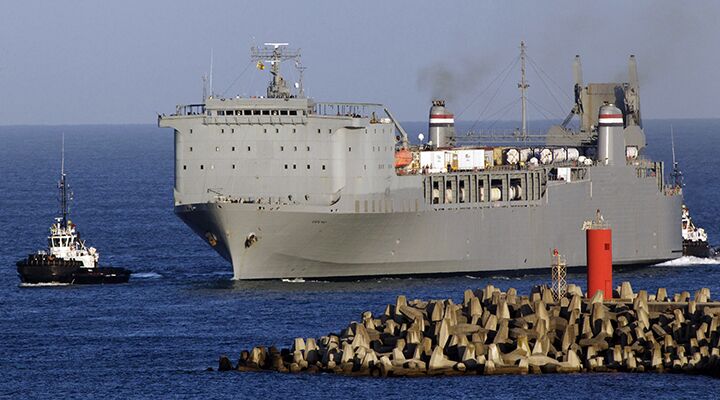
Syrian Chemical Weapons Destroyed: A Victory for America?
Heralded as a watershed moment, a victory for the Obama administration, and a breakthrough in the ongoing conflict in Syria, the last of Syrian President Bashar Assad’s 1,300-ton stockpile of deadly chemical weapons has reportedly been destroyed.
The arduous task of diluting the sarin and other noxious chemicals was carried out in the Mediterranean Sea aboard the custom-outfitted MV Cape Ray—an American vessel.
The disarmament process began in September 2013, when Assad agreed to give up his chemical weapons under a last-minute deal orchestrated by Russia, as the United States stood on the verge of becoming directly involved in the ongoing civil war. While initial delays and missed deadlines plagued the process, it has been completed “in record time, even amid a civil war,” according to U.S. Secretary of State John Kerry.
The New York Times called the event “a rare foreign policy achievement for President [Barack] Obama.”
But can the U.S. really celebrate this moment as a great victory? While nobody can deny that the world is better off without Assad’s 1,300-ton stockpile, the destruction of the weapons is actually a testimony to America’s failures in Syria.
Why Assad Doesn’t Seem to Care
While America was quick to trumpet the success of the endeavor, the loss of Assad’s chemical stockpile has done little to limit his killing power.
Consider: The death toll has reached a staggering 170,000 people. The death toll at the time of the chemical weapon attack in September last year, which nearly sparked an American response but instead led to the disarmament deal, was 115,000.
This highlights a key point. Assad doesn’t need sarin gas or other chemical weapons to massacre people. Nor do the rebels. Both are content to bomb, shoot and behead one another on a daily basis. While no sarin or mustard gas was used to take those lives, the deaths are still coming. Crudely designed “barrel bombs” still indiscriminately level Syrian communities; rebel factions still fill mass graves with fellow rebels, civilians and soldiers alike. The opposing sides work to outdo one another in brutality, each struggling to gain the upper hand.
If the U.S. was ready to carry out airstrikes after Assad killed 1,000 people with chemical weapons, why is there no red line when he kills multiple tens of thousands over the course of a year? Chemical weapons are extremely deadly, but are shrapnel-filled, explosive-laden barrels any different? These crude barrels have claimed more lives in the civil war than chemical weapons have.
So while the removal of the chemical weapons is beneficial, it comes far short of resolving the conflict. In fact, it doesn’t even remove the threat of Assad using chemical weapons in the future.
Taking Assad at His Word
The stockpile may be gone, but Assad still has the capability to create a new arsenal. Despite the September 2013 agreement, he has failed to completely destroy his chemical weapons facilities. The U.S. says it will be watching closely, but there is nothing preventing Assad from using these facilities to rebuild his stockpile.
Added to that is the matter of the word “declared.” The U.S. was careful to state that it has destroyed Assad’s declared chemical weapons. While the international community can speculate on the size of Assad’s arsenal, the only “official” numbers come from Assad himself. The world has no way of knowing if he only handed over a percentage of his chemical weapons, while retaining the remainder.
Chemicals Still in Use
Even if Assad still possesses “undeclared” sarain and mustard gas, plenty of other weaponizable chemicals exist that Assad didn’t have to give up. Chlorine, for instance, is a chemical with many industrial uses, so it wasn’t on the list for Assad to give up. However, chlorine can be used as a deadly weapon, as the Syrian dicatator has shown in a number of attacks. While the U.S. worked to destroy one stockpile, Assad tapped into another. He dropped chlorine bombs onto the town of Kafr Zeita on April 11, killing 1,200 people. That was nearly as high as the number killed in the attack that prompted a U.S. response in August 2013, but Washington remained relatively silent on the chlorine attack.
America’s victory is quickly overshadowed by reality. In this chemical weapons exchange, the world’s superpower was outplayed by the Syrian dictator. Last year, the U.S. stood on the cusp of carrying out devastating attacks on the Syrian government, but the last-minute deal to destroy the chemical weapons turned the tables. It gave Assad another year in power, allowing 55,000 more people to be killed.
The destruction of Syria’s declared chemical weapons is good news in and of itself, but it has come at a high cost. The price paid has been in thousands of lives and American credibility. When Assad crossed President Obama’s red line, and suffered no serious consequences, America’s already-tarnished image as a policymaker backed by force was shattered. With no credibility behind it, any future steps America makes to bring about peace in war-torn Syria will be severely hindered.
Keep watching the situation in Syria with an open mind. While mainstream media focuses on the hopeful news stories such as the destruction of Assad’s chemical weapons, they miss the bigger story. But there is good news for the Middle East. Bible prophecy says that while conflict rages today, a time is coming when the Middle East will be the epicenter of a peace that will extend throughout the whole world.
Read about this future in our free booklet History and Prophecy of the Middle East.
